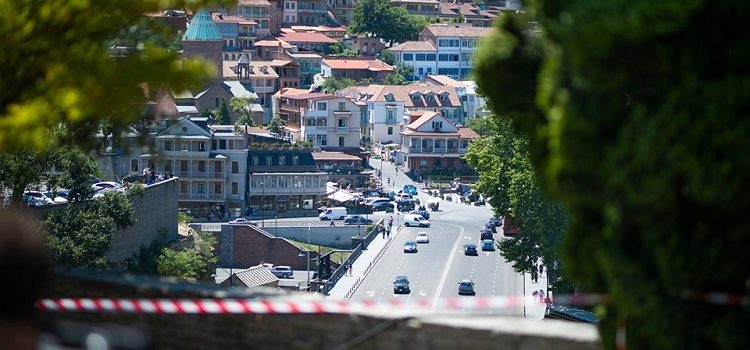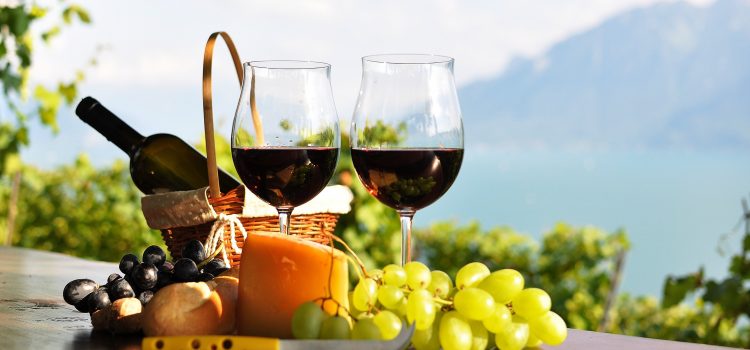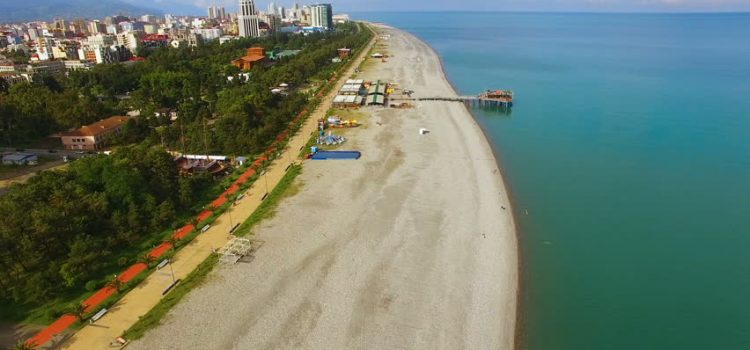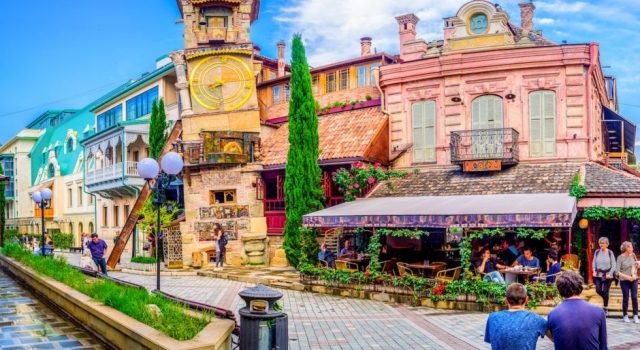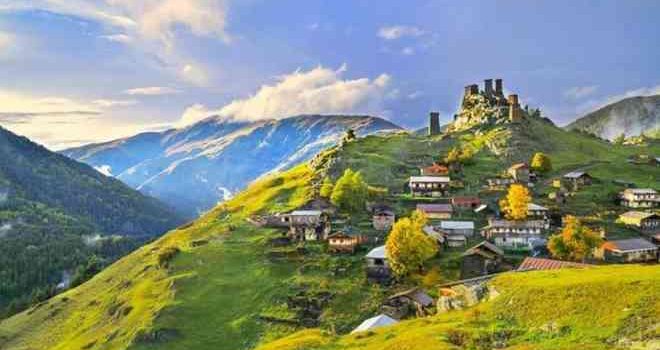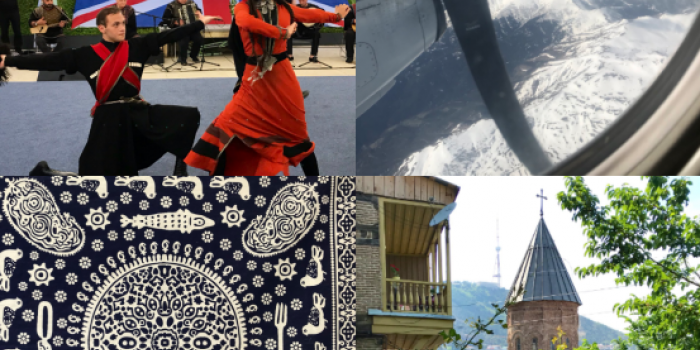Koruldi Lakes in Svaneti – Heaven On Earth
Koruldi Lakes is one of the most magical places in Georgia. The lakes are situated in Upper Svaneti at an altitude of 2850 meters above sea level , 10km away from Mestia, the main regional center of Zemo (Upper) Svaneti.
Koruldi Lakes are surrounded by glaciers and peaks of the Caucasus. Visitors will spot Shkhara, Tetnuldi, Ushba and other peaks of the Caucasus Mountains. The lakes can be reached via a car, horses or hiking. The best view at the place is the Mountain peaks mirroring in the lake.
Svaneti is a historic province in the northwestern part of Georgia. It is surrounded by the Caucasus Mountains. The highest mountain in Georgia, Mount Shkhara (5,201 meters) is located in the province. Svaneti has a unique nature and architectural monuments.
Source: www.georgianjournal.ge, Photo courtesy: Shermazana
18th century iconic Tbilisi palace undergoing restoration
A historic palace located at the foot of Metekhi rock overlooking the Georgian capital of Tbilisi is undergoing major renovation, announces the Tbilisi City Hall.
Built in the 18th century palace Sachino, a summer residence of Queen Darejan, the wife of King Erekle the Second, is one of two palaces in Tbilisi that remains to this day.
About 2 million GEL ($710,480/€629,474) will be spent on the renovation of the Sachino palace (which is also called Queen Darejan Palace) and the work is due to be completed in 16 months.
We will do our best to make this area one of the best [in Tbilisi]. It is a very attractive place for tourists, many people visit the palace… This project is of utmost significance as the palace is a cultural monument,” Tbilisi Mayor Kakha Kaladze said when visiting the renovation site today.
In 16 months the palace complex, which includes the King Erekle’s bath, a church and a fence of the palace, will be completely restored.
Besides, conservation work of the wall painting of the Peristsvaleba [Transfiguration of Jesus] Church will be carried out which will cost 52,000 GEL”, said Kaladze.
The Queen Darejan Palace was built in the form of a castle to protect its inhabitants from continual invasions of foreign occupiers. However, neither the location on the top of the rock, nor the high defensive walls could protect the palace from the Iranian invasion of Agha Mohammad Khan at the end of the 18th century. As a result, the palace was destroyed and ravaged.
After this invasion the King Erekle moved to Telavi, Kakheti where he died in 1798. Having lived for some more time in her palace the queen Darejan was deported to Russia on a charge of a plot against the future head of state appointed by the Russian Emperor.
Source: www.agenda.ge, Photo source: www.agenda.ge
Ajarian Khachapuri at Argentinian Restaurant
Ajarian khachapuri, one of the most outstanding dishes of the traditional Georgian cuisine, has moved beyond the borders of Georgia and is quite successfully establishing itself on the foreign gastronomic markets. It first became popular in the USA, and has just recently appeared on the menu of a prestigious Argentinian restaurant chain, Almacén de Pizzas.
Visitors to the restaurant will have a chance to taste three varieties of Ajarian khachapuri, prepared with four different types of cheese. The options are to include bacon and cheddar, as well as spinach and blue cheese.
The price for discovering the taste of the Georgian gourmet pleasure amounts to 499 pesos, which is about $12.
Khachapuri is Georgian bread stuffed with melted cheese and represents an inseparable part of the Georgian festive table. The Ajarian khachapuri is a boat-shaped khachapuri topped with the raw egg and butter before serving.
source: www.georgiatoday.ge, By Ketevan Kvaratskheliya
Euronews: “Batumi as a center of youth culture”
Euronews has recently published an article about Batumi, a seaside town in Georgia. Thearticle reads that the city witnesses a tourism boom after winning the 2019 title of “Europe’s Leading Emerging Tourism Destination” at the prestigious World Travel Awards. With the number of tourists increased, new hotels have also appeared in Batumi.
“It’s also gaining a reputation as a center of youth culture. Joseph, a young street-artist, believes his city has much more to offer. He’s confident that soon Batumi will be a focal point for creative youth and compete on an equal footing with the capital, Tbilisi,” reads the article about Batumi.
According to the article “Georgia on their minds: why tourists are flocking to the Black Sea”, new trends in Georgia are influenced by the country’s rich culture and history. The article reviews two important cultural heritage of Georgia: wine and polyphonic singing.
The unique ecosystem of Adjara makes it possible to switch between beach and mountains. Due to the diverse experiences available for tourists in Batumi, locals hope they will have a successful season.
Source: www.georgianjournal.ge
Georgian Wine Presented in US Cities
Georgian wine, one of the major parts of the ancient culture of Georgia, has yet another time moved beyond the borders of its homeland. This time, it has been introduced to wider audiences in the USA, in the cities of New York, Chicago and Boston in particular.
At a presentation given by the top-sommelier Taylor Parsons and attended by Georgian wine producers, local entrepreneurs and media representatives, guests were given an opportunity to taste the wine and listen to a seminar on the modern wine industry.
The National Wine Agency of Georgia, the financial supporter of the event, selected the USA as a strategic and promising market for exporting Georgian wine. 354,000 bottles of wine were exported to the USA in the first half of 2019, which is a 90% increase in comparison with the same time period of the last year.
The presentation in the US cities was organized by the contractor marketing company of the National Wine Agency Marq Energie Consulting.
Source: www.georgiatoday.ge; By Ketevan Kvaratskheliya
Image source: National Wine Agency
Georgia on their minds: why tourists are flocking to the Black Sea
The city of Batumi on Georgia’s Black Sea coast is bracing for a tourism boom after winning the 2019 title of “Europe’s Leading Emerging Tourism Destination” at the prestigious World Travel Awards.
In recent years, the region has attracted significant investment. And the results are clearly visible.
The summer season has just begun but already tourist figures are breaking records. Dozens of new hotels have appeared along the coast and the number of international visitors in Batumi has almost doubled since the beginning of this year.
It’s also gaining a reputation as a centre of youth culture.
Joseph, a young street-artist, believes his city has much more to offer.
He’s confident that soon Batumi will be a focal point for creative youth and compete on an equal footing with the capital, Tbilisi.
“You can see how the city has changed on a cultural level – cinema, theatre, music, poetry, architecture, art etc,” he told Focus. “Batumi is in a constant state of development and we are able to create new trends in the cultural life of the city.”
In Georgia new cultural trends are closely intertwined with the country’s rich traditions and history.
It’s no surprise that Georgian polyphonic singing was recognised as Intangible Cultural Heritage by UNESCO.
Add to this the region’s beautiful and diverse landscapes and you get a fuller picture of Adjara and its tourism potential.
You can head straight from the beach to the mountains and picturesque valleys. It’s all possible in Adjara, thanks to its unique ecosystem.
Tornike Rijvadze, Chairman of the Government of Adjara, told Focus: “Ecotourism is actually one of the greatest opportunities we’ve got here. Our agencies work very hard to find new directions. We expect to have quite a successful season this year.”
The region is also famous for its wine. According to archaeologists, winemaking in Georgia can be traced back thousands of years.
Local winemaker Rostom Beridze, said there are almost 500 types of grape varieties in Georgia and about 50 of them grow in Adjara.
“Such diversity gives us an advantage in creating wines that are very different from what you can find elsewhere,” he said.
Beridze added: “It’s impossible to talk about wine and not be in a positive mood. We are very proud of our winemaking heritage.”
Source: www.Euronews.com
tbilisi, possibly the coolest city in the world
When it comes to Tbilisi it’s safe to say the secret’s out. The capital of Georgia has been charming worldwide travellers with its alternative arts scene, world-class clubs and unforgettable cuisine for a while now – and it’s undoubtedly becoming one of the trendiest cities in Europe.
It’s a city of two halves; the Old Town is cluttered with antique stores selling Soviet-era war medals while younger, trendier areas are known for their lively bars filled with locals toasting firewater with strangers. The city feels familiar yet alien all at once, and it’s hard not be overcome by the welcoming Georgian lifestyle.
Georgia’s art scene, fashion and nightlife are behind the influx of traffic. If you’ve been to Berlin then you’ll recognise Tbilisi. They have distinctive similarities but Tbilisi feels effortless. Maybe the city manifests what Berlin was… once upon a time?
Like Berlin, raving is central to younger Georgians’ identity with techno music being the soundtrack to those seeking social liberty and cultural freedom. The underground club Bassiani is a concrete Mecca for techno; the main dance floor is a disused swimming pool and at weekends it’s flooded with smokey, Chacha fuelled clubbers dancing to promising Georgian DJs. Bassiani has sparked the question – could Tbilisi be the new Berlin?
With the rapid increase in tourism, we recommend jumping on Georgia now. Flights may be a little higher than you would like BUT it’s seriously worth it. Tbilisi is everything you need in a city break: be it a romantic getaway or a wild weekend with your pals. This rough-cut Caucasus gem will leave you wanting to pack your bags and relocate… if only we could speak the language!
Need help planning a to-do list? Here’s our list of the essentials things to do in our new favourite city.
source: www.mtv.co.uk
The Daily Beast about Tusheti: The Last Wild Place in Europe
The Daily Beast has recently published an article about Tusheti, a historic region in northeast Georgia. Benjamin Kemper, the author of the article claims that the venue is the last wild place in Europe. He had visited Georgia many times but Tusheti had always been out of reach. The road to Tusheti is one of the most dangerous drives in the world.
“Even at the height of summer, it takes six hours of nauseous off-roading from the nearest town to reach the first Tushetian hamlets, and once you’ve arrived, you can all but forget creature comforts like cell service, internet, ATMs, and heat. But I was sold: The promise of an off-the-grid adventure in one of the last truly wild corners of Europe was too enticing to pass up,” reads the article about Tusheti.
The intact nature of Tusheti awaits visitors. The area is inhabited by “mountain goats, imperial eagles, brown bears, and, if you’re lucky, rare indigenous species like the Caucasian black grouse and East Caucasian tur, a goat-antelope with horns so enormous they look like they belong on a triceratops. There are even occasional, if uncorroborated, Persian leopard sightings.”
A herd of animals is moving forward on rocky slopes of the Great Caucasus Mountain and the scene can be observed from almost any place in Tusheti. The centuries-old towers will amaze visitors by their greatness and long-standing history. The towers used to be refuges protecting the locals from invaders or fatal avalanches.
“Medieval Tushetians did not mess around—they had their freedom to protect. From the earliest written records until well into to the 17th century, they enjoyed virtual autonomy as a tribal democracy. Although Tushetians coexisted fairly peacefully through the centuries with neighboring tribes such as the Chechens, Khevsurs, Lesghians, and Hinukhs, and traded often with them, they remained culturally distinct with their animist deities, transhumant lifestyle, fast-footed dances, and twangy dialect,” reads the article about the history of Tusheti.
Upon the hills, one can find a cluster of shrines called khatebi that is allegedly dedicated to Pagan-Christian demigods. Meanwhile, visiting a family in Tusheti will definitely involve tasting the traditional lamb-stuffed khinkali (Georgian dumpling).
Interested in the future of the region, Nugzar Idoidze, one of the locals of the village Omalo in Tusheti cheers the author up by saying that since Tushetians survived the Soviet pressure, they can survive anything.
The Daily Beast is an American news and opinion website focused on politics and pop culture.
source: www.Georgianjournal.ge
A few things why you should visit Georgia by British Ambassador
Justin McKenzie Smith, a British ambassador to Georgia has recently posted photos of Georgia on Twitter with the caption: “These are a few of my favorite things. #VisitGeorgia #WorldWelcomeToGeorgia #SpendSummerInGeorgia”. The photos reflect Georgian traditional dances, Old Tbilisi, Looking over Georgian mountains from an airplane and Georgian blue tablecloth.
The campaign ‘Spend Your Summer in Georgia’ has been launched by Georgian activists together with businessmen and international society in response to the ban on Russian airlines from carrying Russian citizens to Georgia from July 8. The campaign aims at popularizing Georgia as a travel destination to tackle the possible difficulties due to the decreased number of incoming Russian tourists. Besides, Russian tourists have encouraged their Georgian friends by saying that they will find other ways to reach Georgia.
The ban was followed by the cancellation of the Inter-Parliamentary Assembly on Orthodoxy. The assembly was led by the President of the Inter-Parliamentary Assembly on Orthodoxy, Sergei Gavrilov, a deputy of the Russian Duma from the Communist Party. Angered by the presence of Sergei Gavrilov in Georgia, citizens gathered at the Parliament building in Tbilisi to protest Russian occupation in Georgia.
Source: www.Georgianjournal.ge, Photo: www.Georgianjournal.ge


